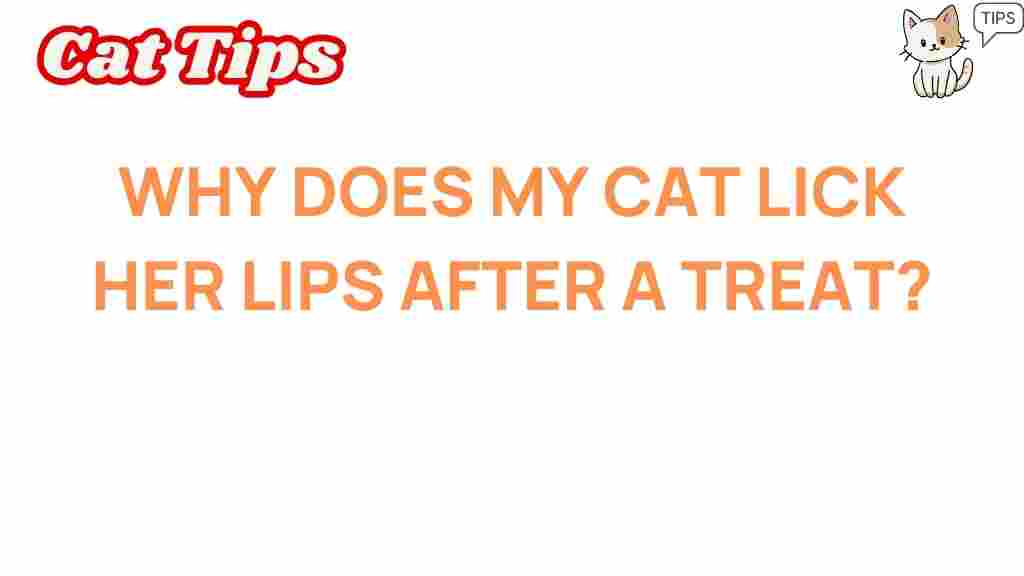Understanding Cat Behavior: The Mystery Behind Your Cat’s Lip-Licking After Treats
As a cat owner, you may have noticed your feline friend engaging in curious behaviors after indulging in a tasty treat. One of the most common behaviors is lip-licking. This intriguing action can leave many cat owners puzzled, wondering what it signifies. In this article, we will delve into the reasons behind this fascinating aspect of cat behavior, helping you better understand your furry companion.
Why Do Cats Lick Their Lips?
To grasp the context of lip-licking in cats, it’s essential to consider why this behavior occurs in the first place. Here are some key reasons:
- Anticipation: When cats know they are about to receive a treat, they may lick their lips in anticipation, similar to how humans might salivate at the thought of food.
- Taste Sensation: After consuming a treat, cats often lick their lips to savor lingering flavors. This behavior is instinctual, as it helps them clean their mouths.
- Comfort and Soothing: Lip-licking can also serve as a self-soothing mechanism. If your cat feels anxious or uncomfortable, they may lick their lips as a way to calm down.
- Hygiene: Cats are meticulous groomers. Their grooming habits include licking their lips to remove food particles and maintain cleanliness.
The Role of Treats in Cat Behavior
Treats play a significant role in shaping cat behavior. They are not just a reward; they can influence your cat’s mood and interactions. Here’s how treats impact cat behavior:
- Positive Reinforcement: Cats respond well to positive reinforcement. Giving treats can encourage good behavior, making your cat more likely to repeat desired actions.
- Bonding Experience: Sharing treats can strengthen the bond between you and your cat. This shared experience can lead to more affectionate behavior.
- Mood Enhancement: Treats can elevate your cat’s mood. This can lead to playful and affectionate behavior, often accompanied by lip-licking.
Step-by-Step: Observing Lip-Licking in Your Cat
If you want to understand the lip-licking behavior further, follow these steps to observe your cat effectively:
- Pay Attention: Note when your cat licks their lips. Is it immediately after eating, or does it happen during other activities?
- Observe Body Language: Look for other signs of behavior, such as purring, tail position, or overall demeanor. This context can provide insights into their emotional state.
- Consider the Treat Type: Different treats have varying textures and flavors. Monitor if certain treats elicit more pronounced lip-licking.
- Document Your Observations: Keep a record of your observations. Over time, patterns may emerge that can help you understand your cat’s behavior better.
Common Misinterpretations of Lip-Licking
While lip-licking is typically harmless and rooted in natural behavior, there are some common misinterpretations:
- Hunger: Some owners may misinterpret lip-licking as a sign of hunger. However, it often indicates satisfaction or enjoyment rather than a need for food.
- Illness: If lip-licking is excessive or accompanied by other concerning symptoms (like vomiting or lethargy), it may indicate an underlying health issue. Consult your veterinarian if this occurs.
- Stress or Anxiety: While lip-licking can be soothing, it may also indicate stress. If your cat licks their lips frequently and shows other signs of anxiety, consider evaluating their environment.
Troubleshooting Lip-Licking Behavior
If you notice that your cat’s lip-licking behavior seems excessive or unusual, consider the following troubleshooting tips:
- Evaluate Their Diet: Ensure that your cat’s diet is nutritionally balanced. Sometimes, deficiencies can lead to abnormal behaviors.
- Check for Allergies: Food allergies can cause discomfort, leading to lip-licking. Monitor your cat for signs of allergies, such as itching or gastrointestinal upset.
- Provide a Calm Environment: Stress can exacerbate lip-licking behavior. Create a safe space for your cat to relax and unwind.
- Consult a Veterinarian: If you’re concerned about your cat’s lip-licking behavior, a veterinary check-up can rule out health issues.
Conclusion
Understanding your cat’s behavior, especially lip-licking after treats, can enhance your relationship with them. This behavior is typically a mix of anticipation, enjoyment, and a natural instinct to maintain hygiene. By observing your cat and understanding the context of their actions, you can better cater to their needs and ensure they live a happy, healthy life.
For more insights into cat behavior and how to improve your cat’s environment, check out our comprehensive guide.
In summary, pay attention to your cat’s lip-licking and recognize it as a natural behavior that signifies more than just a craving for treats. By embracing this understanding, you can deepen the bond with your feline friend and ensure their well-being.
This article is in the category Behavior and created by CatTips Team
